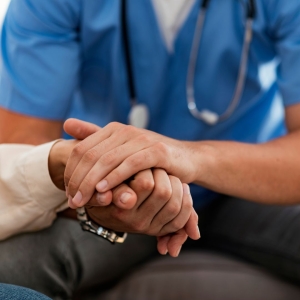In Birmingham and Solihull, our Urgent Community Response (UCR) service provides urgent care, seven-days a week to people in their homes, which helps to avoid hospital admissions and enable people to live independently for longer.
UCR is a service that has been set up to help adults, often older or with complex care needs, who have a health crisis and are suddenly deteriorating through a fall, infection, frailty or exacerbation of an illness.
The UCR team can assess and treat patients in their own home, including residential care homes, within two hours. The referral service offers an alternative to calling an ambulance and helps to avoid unnecessary hospital admission or readmission.

A health crisis could include one or more of the following issues:
- Falls, where there are no obvious injuries, and the patient hasn’t fainted
- Frailty: a condition leading to a loss of strength and ability to do day-to-day things
- Sudden or a gradual decline in mobility
- End-of life-support: how to manage symptoms and pain relief in line with the person’s wishes
- Equipment assessment that may lead to equipment being provided so the patient remains safe
- Suddenly being confused or increasing confusion
- Catheter management, such as blockages or other pain associated with it
- Diabetes support, where there are concerns over a person’s blood sugar levels
- Unpaid carer breakdown, where the usual carer is not able to due to their own ill health or carer stress.
This service is available to anybody 17 years and over who lives in Birmingham or Solihull or is a registered with a GP practice in Birmingham and Solihull.
Accessing the Urgent Community Response (UCR) service
Patients are referred to the service via a number of routes including:
- The ambulance service (if you have phoned 999 and a paramedic has attended)
- Your own GP
- Other NHS community services (who may already be visiting you for more planned care)
- Social Care and the Local Authority
If a patient is already being visited by a community service for planned care, the patient will have a contact number for the visiting team. If the patient rings this number and the call is assessed as urgent, the patient may be put through to the urgent community response team.
The UCR service aims to see people within two hours. A UCR clinician will visit to carry out an assessment and develop a treatment plan which will be agreed with the patient and / or their family.
The UCR clinician may start treatment and if appropriate and then refer you on to another team or to your GP, who will continue with the treatment and monitoring until they are better.
The UCR team can also make referrals to other parts of the NHS for example physiotherapy and occupational therapy, as required.
The UCR’s aim is to treat people in their own home, or residential care home, because it is always better for an older person’s long-term independence if they can stay in their usual place of residence instead of being admitted to hospital.
This is because being inactive leads to deconditioning and muscle loss which can then limit their ability to live independently once they have been discharged.